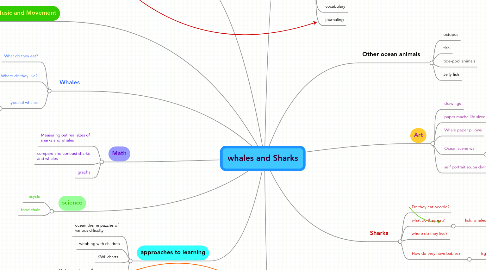whales and Sharks
作者:Kristine Binderup


1. Whales
1.1. What do they eat?
1.2. Where do they live?
1.2.1. hot or cold water
1.2.2. Deep or shallow
1.3. types of whales
1.3.1. baleen
1.3.2. toothed
2. Math
2.1. Measuring out real sizes of sharks and whales
2.2. compare and contrast sharks and whales
2.3. graphs
3. approaches to learning
3.1. ocean theme puzzles of various dificulty
3.2. webbing with children
3.3. KWL charts
3.4. Metacognition with conversations about Whales and Sharks.
4. social emotional
4.1. sharing materials
4.2. games with simple rules
4.2.1. Shark predator and prey
4.3. listening and participating in others stories
5. science
5.1. lifecycle
5.2. food chain
6. Music and Movement
6.1. Shark and whale chase games
6.2. songs
6.2.1. Whats so great about a big white shark
6.2.2. Baby Beluga
6.2.3. down by the sea
6.2.4. slippery fish
7. Other ocean animals
7.1. octopus
7.2. fish
7.3. tide-pool animals
7.4. Jelly fish
8. Sharks
8.1. Do they eat people?
8.2. what do they eat?
8.2.1. fish, whales, dolphins, crab, octopus
8.3. where do they live?
8.4. How do they have babies?
8.4.1. Eggs
8.4.1.1. spiral egg sack
8.4.1.2. square egg sack
9. Art
9.1. drawings
9.2. paper mache life sized shark
9.3. Whale paper pillows
9.4. Ocean scene wall
9.4.1. Add sharks and whales, and other sea creatures to it throughout study.
9.5. self portrait scuba diving
10. language
10.1. KWL
10.2. Vocabulary
10.2.1. parts of whale and shark
10.2.2. equipment used to view and research
10.2.3. everyday words
10.3. Dictation and stories
11. Literacy
11.1. whale and shark books
11.2. class book about what we learned
11.3. Book
11.3.1. don't eat the teacher
11.3.2. Baby beluga
11.3.3. surprising shark
11.3.4. rainbow fish
11.3.5. gental giant octopus
